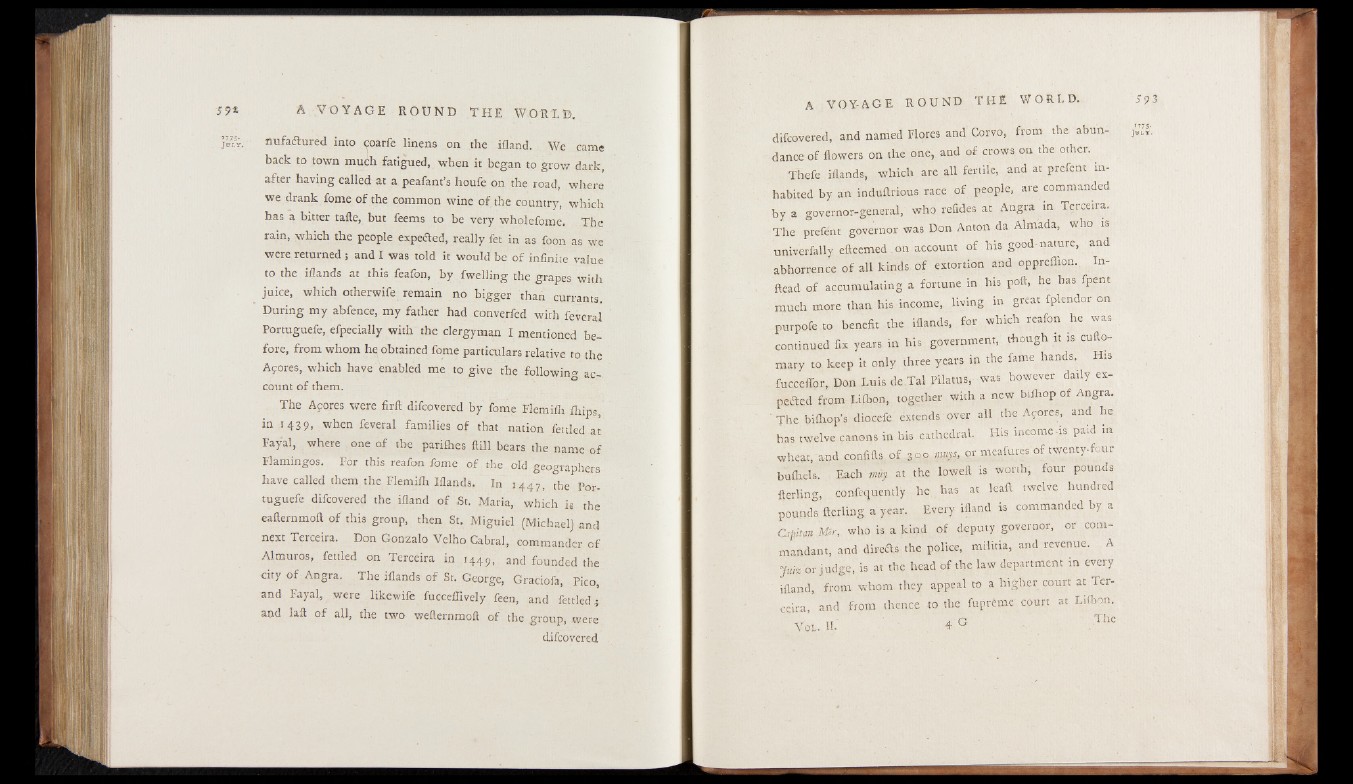
5 9® A VOYAGE ROUND T HE WORLD.
P i nufadlured into çoarfe linens on the ifland. We came
back to town much fatigued, when it began to grow dark,
after having called at a peafant’s houfe on the road, where
we drank fome of the common wine of the country, which
has a bitter tafte, but feems to be very wholefome. The
rain, which the people expected, really fet in as foon as we
were returned ; and I was told it would be of infinite value
to the iflands at this feafon, by fwelling the grapes with
juice, which otherwife remain no bigger than currants.
During my abfence, my father had converfed with feveral
Portuguefe, efpecially with the clergyman I mentioned before,
from whom he obtained fome particulars relative to the
Açores, which have enabled me to give the following account
of them.
The Açores were firft difcovered by fome Flemifli fliips,
in 1439, when feveral families of that nation fettled at
Faÿal, where one of the pariflies ftill bears the name of
Flamingos. For this reafon fome of the old geographers
have called them the Flemilh Iflands, In 1447, the Portuguefe
difcovered the ifland of St. Maria, which is the
eafternmoft of this group, then St. Miguiel (Michael] and
next Terceira. Don Gonzalo Velho Cabral, commander of
Almuros, fettled on Terceira in 1449, and founded the
city of Angra. The iflands of St. George, Graciofa, Pico,
and Fayal, were likewife fucceflively feen, and fettled
and laft of all, the two wefternmoft of the group, were
difcovered
difcovered, and named Flores and Corvo, from the abundance
of flowers on the one, and of crows on the other.
Thefe iflands, which are all fertile, and at prefent inhabited
by an induftrious race of people, are commanded
by a governor-general, whq refides at Angra in Terceira.
The prefent governor was Don Anton da Almada, who is
univerfally efteemed on account of his good-nature, and
abhorrence of all kinds of extortion and oppreflion., g g
ftead of accumulating a fortune in his poft, he has fpent
much more than his income, living in great fplendof on
purpofeto benefit the iflands, for which reafon he was
continued fix years in his government, though it is cufto-
mary to keep it only three years in the fame hands, / His
fucceffor, Don Luis de.Tal Pijatus, was however daily expected
from Lifbon, together with a new bifhop of Angra.
' The bilhop’s diocefe extends over all the Açores, and he
has twelve canons in his cathedral. His income-is paid in
wheat, and confifts of .3 00 mu?j, or meafures of twenty-four
bufbels. Each way at the loweft is worth, four pounds
fterling, confequently he has at leaft twelve hundred
pounds fterling a year. Every ifland is commanded by a
Capitaji Mir, who is a kind of deputy governor, or commandant,
and directs the police, militia, and revenue. A
Juiz or judge, is at the head of the law department in every
ifland, from whom they appeal to a higher court at Terceira,
and from thence to the fuprême court at Lifbon.
r TT' A O The V o l . II. 4 ^
*775- J u l y .